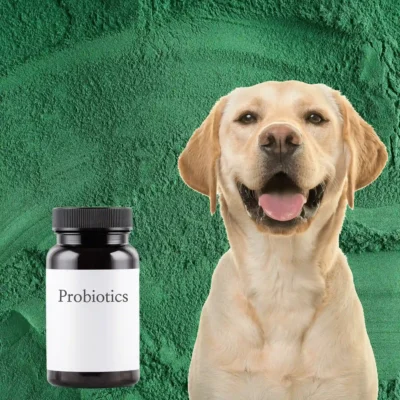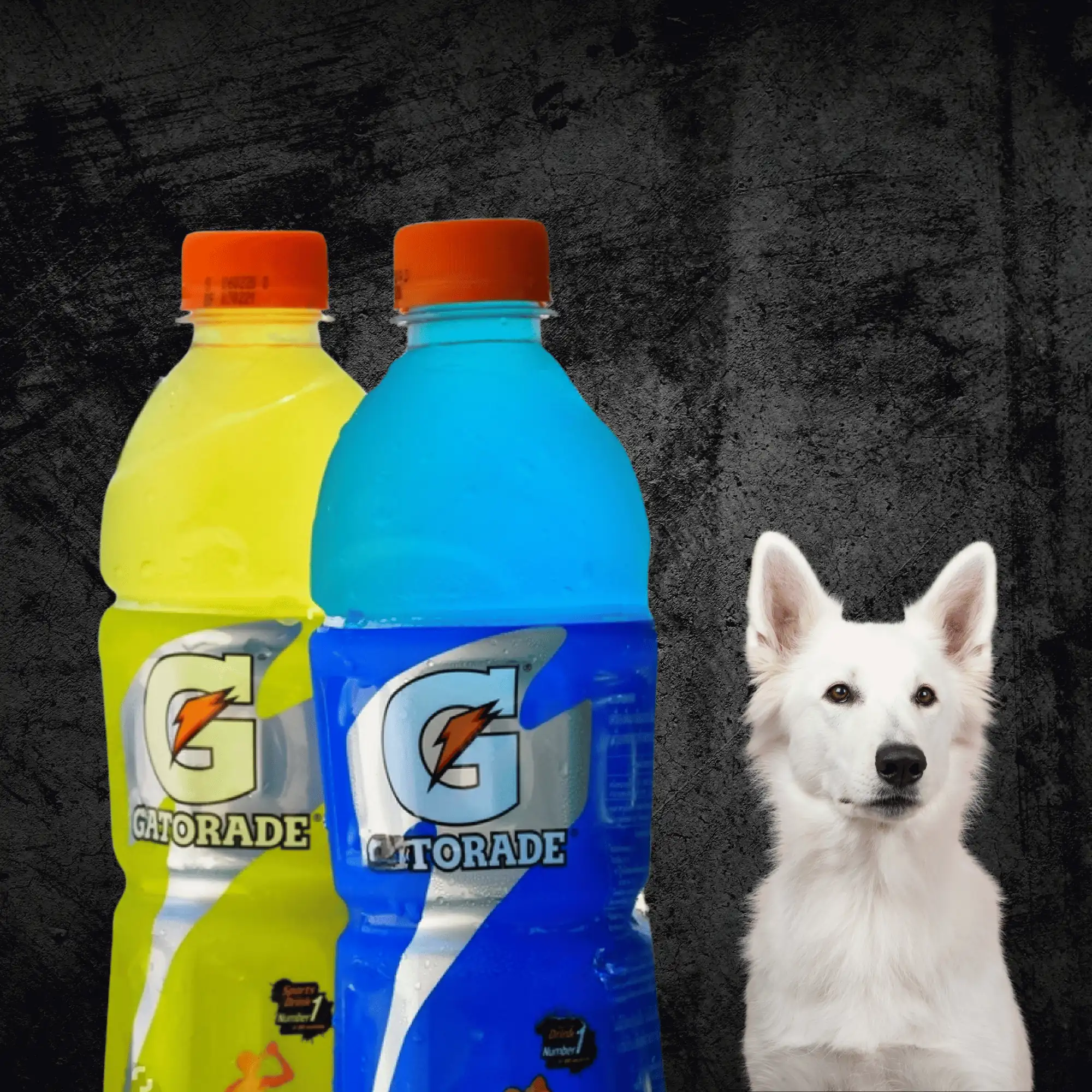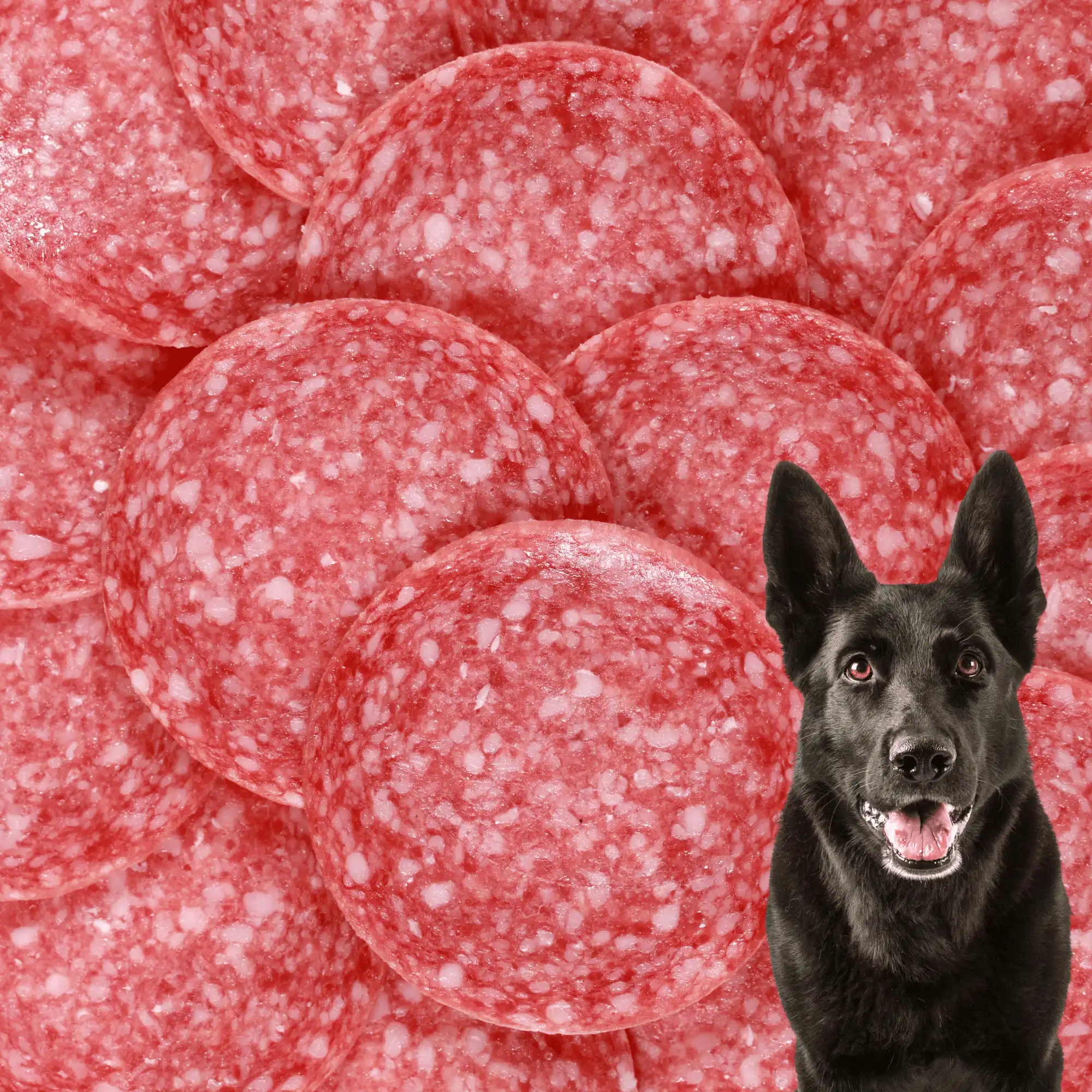Probiotics have become increasingly popular for their potential health advantages, not only for humans but also for our beloved canine companions. Similar to humans, dogs host billions of beneficial bacteria in their gastrointestinal tract, playing a pivotal role in digestion, nutrient production, and immune system support. If your dog is experiencing digestive issues like diarrhea, you might consider using probiotics to aid in their recovery.
In this article, we will explore the suitability of probiotics for dogs, delving into their benefits, different types, and the most effective probiotics for canine well-being. Additionally, we will discuss how to administer probiotics to your furry friend.
Here are the topics we’re going to discuss in this blog post:
- What are Probiotics for Dogs?
- What are Prebiotics?
- Can Dogs Take Human Probiotics?
- Signs that Your Dogs Need Probiotics
- Types of Probiotics
- How Do You Choose the Best Probiotics for Dogs?
- Benefits of Probiotics for Dogs
- Side Effects of Probiotics for Dogs
- How Do You Administer Probiotics to Your Dog?
What are Probiotics for Dogs?
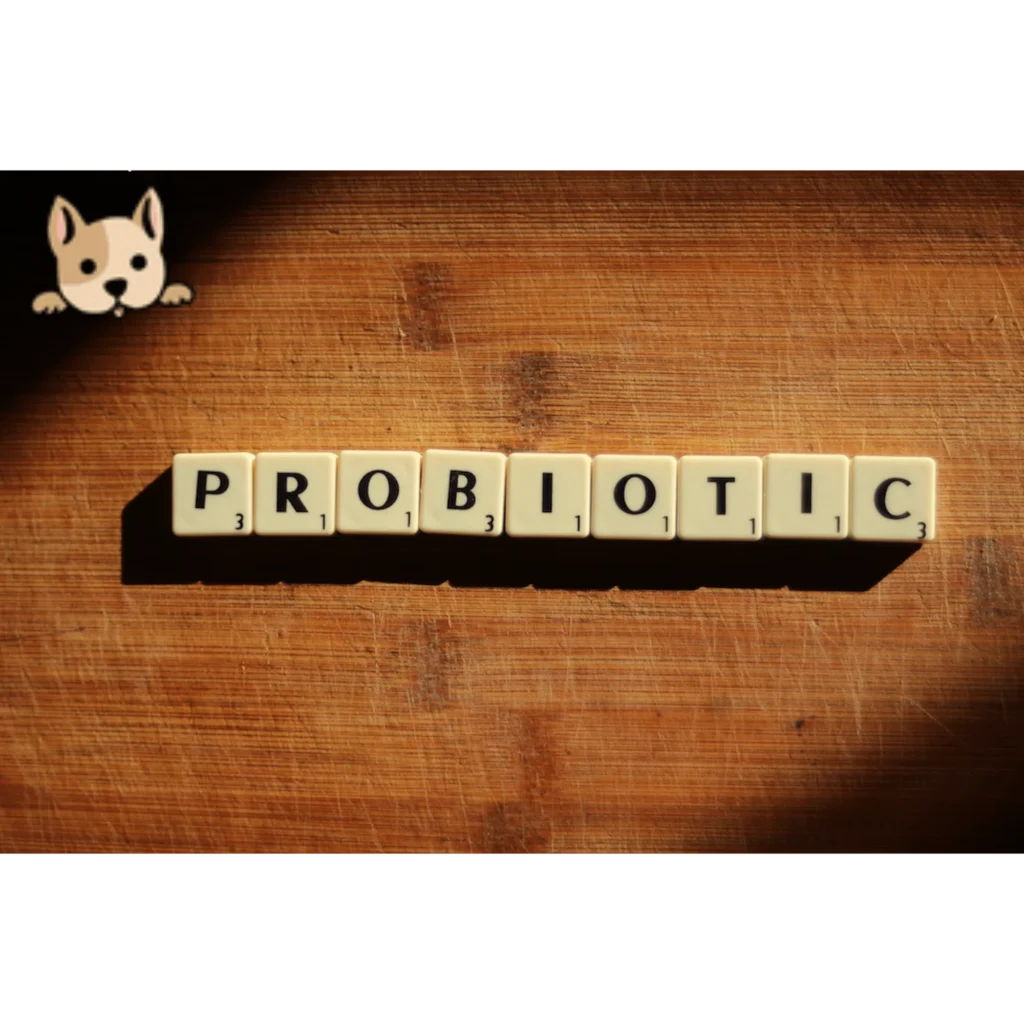
Probiotics are beneficial microorganisms residing in the digestive tract, comprising billions of bacteria and some yeast. Dogs, among other animals, harbor these essential gut microbes within their gastrointestinal system. These healthy microorganisms play a crucial role in balancing the internal environment to ward off diseases and promote overall health.
Functions performed by gastrointestinal microorganisms include:
- Food Breakdown: Probiotics aid in the breakdown of food, facilitating digestion and promoting nutrient absorption.
- Nutrient and Vitamin Production: They contribute to the production of essential nutrients and vitamins, ensuring proper metabolic functions within the body.
- Pathogen Defense: Probiotics help in combating potential pathogens that may enter the digestive system, bolstering the body’s defense mechanisms against infections.
- Immune System Support: By enhancing the immune response, probiotics strengthen the body’s ability to fend off infections and maintain overall health.
- Gut-Brain Axis Interaction: Probiotics interact with the “gut-brain axis,” a communication network between the gastrointestinal system and the brain, which plays a vital role in regulating mood and mental well-being.
Overall, the presence of probiotics in the digestive tract of dogs is essential for maintaining optimal health and well-being and influencing various physiological processes critical for their overall health.
What are Prebiotics?
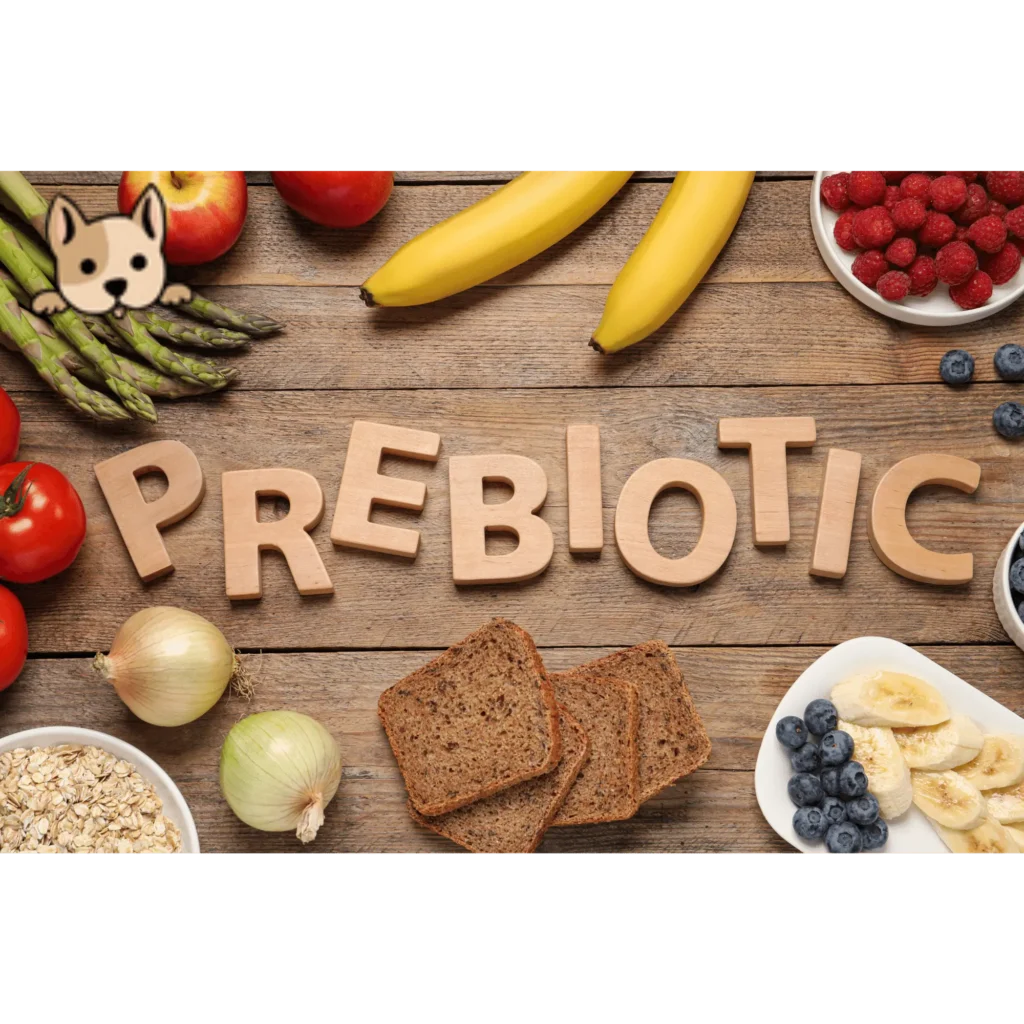
You may have also come across prebiotics. Wondering how they differ from probiotics?
Prebiotics play a significant role alongside probiotics in supporting gut health, but they operate in a slightly different manner.
Prebiotics are a type of non-digestible fiber that serves as food for the beneficial bacteria already present in the colon, including probiotics. Essentially, prebiotics fuel probiotics, promoting their growth and activity within the gut. By nourishing these beneficial bacteria, prebiotics help to maintain a healthy balance of microorganisms in the digestive tract.
Prebiotics are commonly found in high-fiber foods such as fruits, vegetables, whole grains, and legumes. Some examples of prebiotic-rich foods include bananas, onions, garlic, asparagus, oats, and beans.
In summary, while probiotics are live microorganisms that confer health benefits when consumed, prebiotics are indigestible fibers that serve as food for these beneficial bacteria. Together, they work synergistically to promote gut health and support overall well-being.
Can Dogs Take Human Probiotics?
Dogs can benefit from probiotics specifically designed for them, and it’s not advisable to give them human probiotic supplements.
Dogs have distinct digestive systems and gut microbiomes compared to humans. Human probiotics may not provide the intended benefits for dogs and could potentially lead to adverse effects. Additionally, certain human probiotic products may contain harmful ingredients such as xylitol, a sugar substitute highly toxic to dogs.
Opting for probiotics formulated specifically for dogs is a safer and more effective choice. These products are tailored to meet the unique needs of canine digestive health. Fortunately, there is a wide selection of dog-specific probiotic options available, particularly here in Australia, eliminating the need to resort to human probiotic supplements for your pet.
Signs that Your Dogs Need Probiotics:
Even your dog deserves a day off sometimes! If you notice your furry friend experiencing low energy levels, unusual behavior, or digestive issues, probiotics for dogs might be the solution.
Dog probiotics have gained popularity for good reason. They promote excellent gut health and offer a range of health-related benefits for our canine companions. With their ability to support digestion and overall well-being, probiotics are a fantastic choice for almost any dog.
Here are some signs that your dog may need probiotics:
- Dog diarrhoea
- Stomach noise and bad gas
- Allergies
- Irregular potty schedule
- Yeast Infection
- Losing Weight
- Anxiety
- Immune System
- Skin Issues
- Chronic illness
- Foul breath
Types of Probiotics:
Probiotics are live microorganisms that, when consumed in sufficient quantities, provide health benefits to the host organism. In the context of dogs, probiotics can come in various forms, each containing different strains of beneficial bacteria. Here are some common types of probiotics used for dogs:
1. Lactobacillus:
This genus of bacteria is commonly found in yogurt and other fermented foods. Lactobacillus strains are known for their ability to produce lactic acid, which helps regulate the pH balance in the intestines and inhibit the growth of harmful bacteria.
2. Bifidobacterium:
Bifidobacteria are another type of beneficial bacteria that naturally reside in the gastrointestinal tract. They play a role in breaking down carbohydrates and producing essential vitamins. Bifidobacterium strains are often used in probiotic supplements for dogs to support digestive health.
3. Enterococcus:
Enterococcus is a genus of bacteria that can help maintain a balanced microbial environment in the intestines. Certain strains of Enterococcus have been shown to have probiotic properties and may be included in dog probiotic formulations.
4. Saccharomyces boulardii:
Unlike other probiotics, Saccharomyces boulardii is a yeast rather than a bacterium. It has been studied for its ability to support gastrointestinal health by promoting the balance of gut flora and helping to reduce diarrhea associated with antibiotic use or other causes.
5. Bacillus coagulans:
Bacillus coagulans is a spore-forming bacterium that is stable at room temperature and survives in the acidic environment of the stomach. It has been researched for its potential benefits in supporting digestive health and immune function in dogs.
6. Lactococcus:
Lactococcus bacteria are commonly used in the fermentation of dairy products. While less studied than some other probiotic strains, certain Lactococcus strains may have probiotic properties that benefit dogs’ digestive systems.
When selecting a probiotic supplement for your dog, it’s essential to choose one that contains strains that have been specifically researched and shown to be beneficial for canine health. Additionally, it’s important to follow dosing instructions carefully and consult with your veterinarian before starting any new supplement regimen for your dog.
How Do You Choose the Best Probiotics for Dogs?
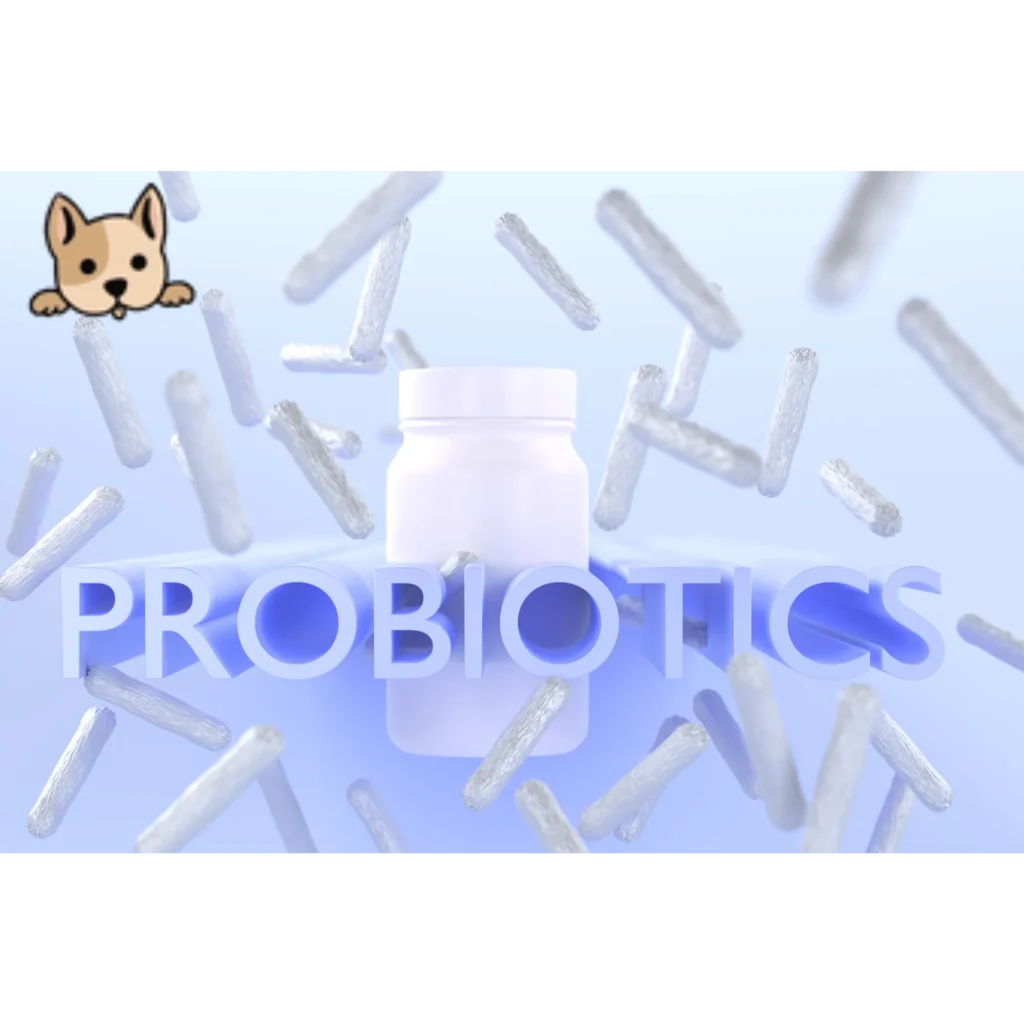
Finding the right probiotic for your dog can significantly support their digestive health and overall well-being. Here are some key factors to consider when selecting the perfect probiotic:
Strains:
Opt for probiotics that contain a blend of beneficial bacteria strains such as Lactobacillus, Bifidobacterium, and Enterococcus. A diverse combination of strains can provide comprehensive support for your dog’s gut health.
Dosage:
Ensure that the probiotic you choose offers a high number of colony-forming units (CFUs) per serving. This guarantees that your dog receives a therapeutic dose capable of making a positive impact on their health.
Delivery Method:
Probiotics come in various forms, including powders, chews, and liquids. Consider your dog’s preferences and select a delivery method that they are most likely to accept. Powder supplements are convenient, as they can be easily mixed with your dog’s kibble.
Consult with a Veterinarian:
Before starting your dog on a probiotic regimen, especially if they have a specific health condition, it’s essential to consult with a veterinarian. A vet can provide valuable guidance on selecting the right probiotic and ensuring it aligns with your dog’s individual health needs.
Remember, not all probiotics are created equal, so it’s crucial to choose a high-quality product specifically formulated for dogs. Additionally, it’s important to be patient, as probiotics may take several weeks to demonstrate noticeable results. Consistently provide the recommended dose as directed to maximize the benefits for your furry friend’s health.
Benefits of Probiotics for Dogs:
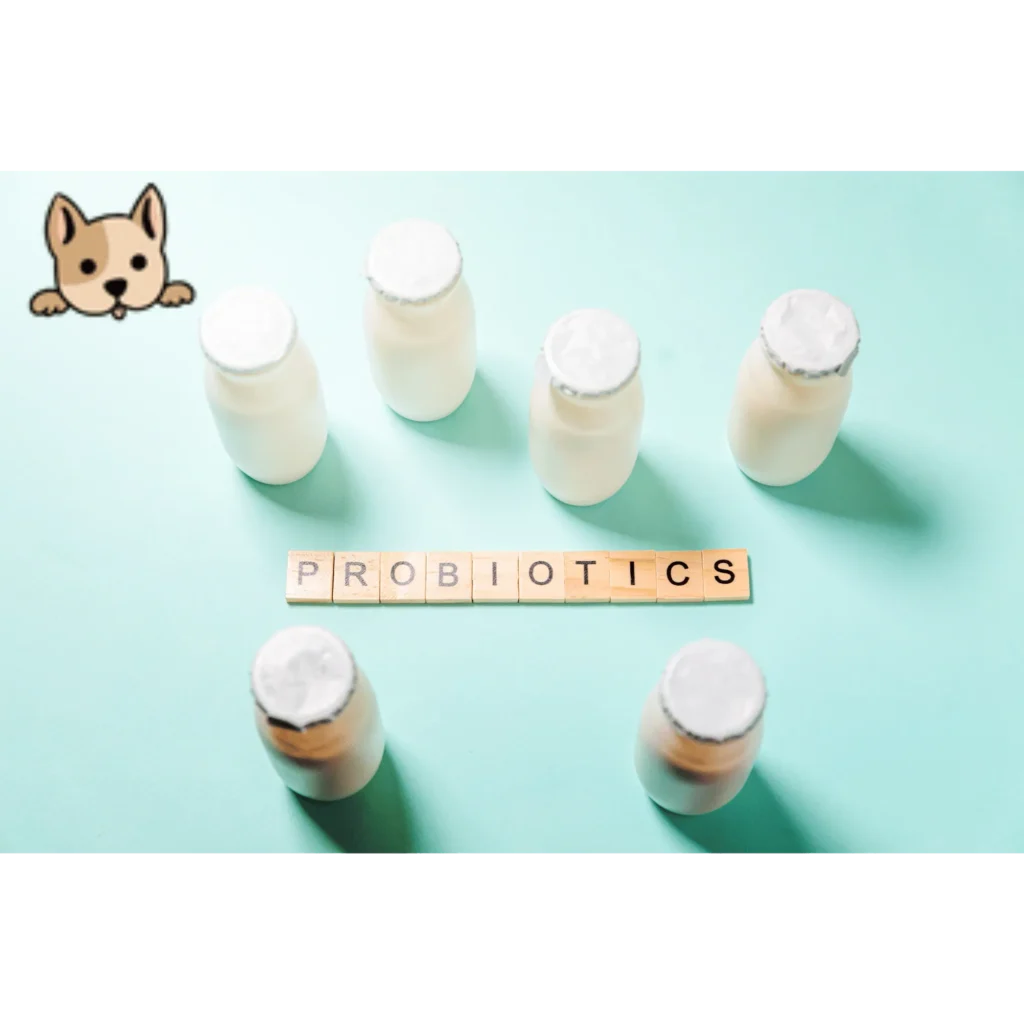
Probiotics offer several potential benefits for dogs, particularly in supporting their digestive health and overall well-being. Here are some of the key perils of probiotics for dogs:
1. Improved Digestive Health:
Probiotics help maintain a healthy balance of gut bacteria, which is essential for proper digestion and nutrient absorption.
They can aid in the breakdown of food, reduce gas and bloating, and alleviate symptoms of gastrointestinal issues such as diarrhea and constipation.
2. Support for Immune Function:
The majority of a dog’s immune system resides in the gut, so maintaining a healthy balance of gut bacteria is crucial for optimal immune function.
Probiotics can help support the immune system by enhancing the production of
antibodies and strengthen the intestinal barrier against harmful pathogens.
3. Reduction of Digestive Upset:
Probiotics may help reduce the incidence and severity of digestive upset, particularly during times of stress, dietary changes, or antibiotic use.
They can help stabilize the gut microbiota and minimize disruptions that can lead to digestive issues.
4. Management of Inflammatory Conditions:
Certain probiotic strains have anti-inflammatory properties and may help manage inflammatory conditions such as inflammatory bowel disease (IBD) or allergies in dogs.
By modulating the immune response and reducing inflammation in the gut, probiotics can contribute to symptom relief and improved quality of life.
5. Support for Skin and Coat Health:
A healthy gut microbiome is linked to skin and coat health in dogs. Probiotics can help address underlying gut issues that may contribute to skin problems such as itching, hot spots, and recurrent ear infections.
By promoting a balanced gut environment, probiotics may contribute to a shinier coat and healthier skin.
6. Enhanced Nutrient Absorption:
Optimal digestion is essential for the absorption of nutrients from food. Probiotics help break down food more efficiently and facilitate nutrient absorption in the intestines, ensuring that dogs receive the full nutritional benefit from their diet.
7. Reduced Risk of Antibiotic-Associated Diarrhea:
Antibiotics can disrupt the natural balance of gut bacteria, leading to diarrhea and other digestive issues in dogs.
Probiotics can help replenish beneficial bacteria and reduce the risk of antibiotic-associated diarrhea by restoring balance to the gut microbiota.
8. Support for Dogs with Food Sensitivities:
Dogs with food sensitivities or allergies may benefit from probiotics, as they can help regulate the immune response and reduce inflammation in the gut.
By promoting a healthier gut environment, probiotics may contribute to better tolerance of certain foods and reduced allergic reactions.
Overall, probiotics can play a valuable role in promoting digestive health, supporting the immune system, and enhancing overall well-being in dogs. However, it’s essential to choose a high-quality probiotic supplement specifically formulated for dogs and consult with your veterinarian before starting any new supplement regimen.
Side Effects of Probiotics for Dogs:
Some dogs may experience side effects when initially starting probiotics, especially at high doses. These side effects may include:
- Digestive discomfort
- Diarrhea
- Bloating
- Gas
- Constipation
- Allergic reaction
It’s worth noting that a dog’s digestive symptoms may temporarily worsen before they improve when introducing probiotics. Changes in appetite could also indicate an early adverse reaction. If your dog does not respond well to probiotics or if you have any concerns about their digestive health, it’s essential to discuss these issues with your veterinarian. Your vet can provide guidance tailored to your dog’s specific needs and help address any concerns you may have regarding their well-being.
How Do You Give Probiotics to Your Dog?
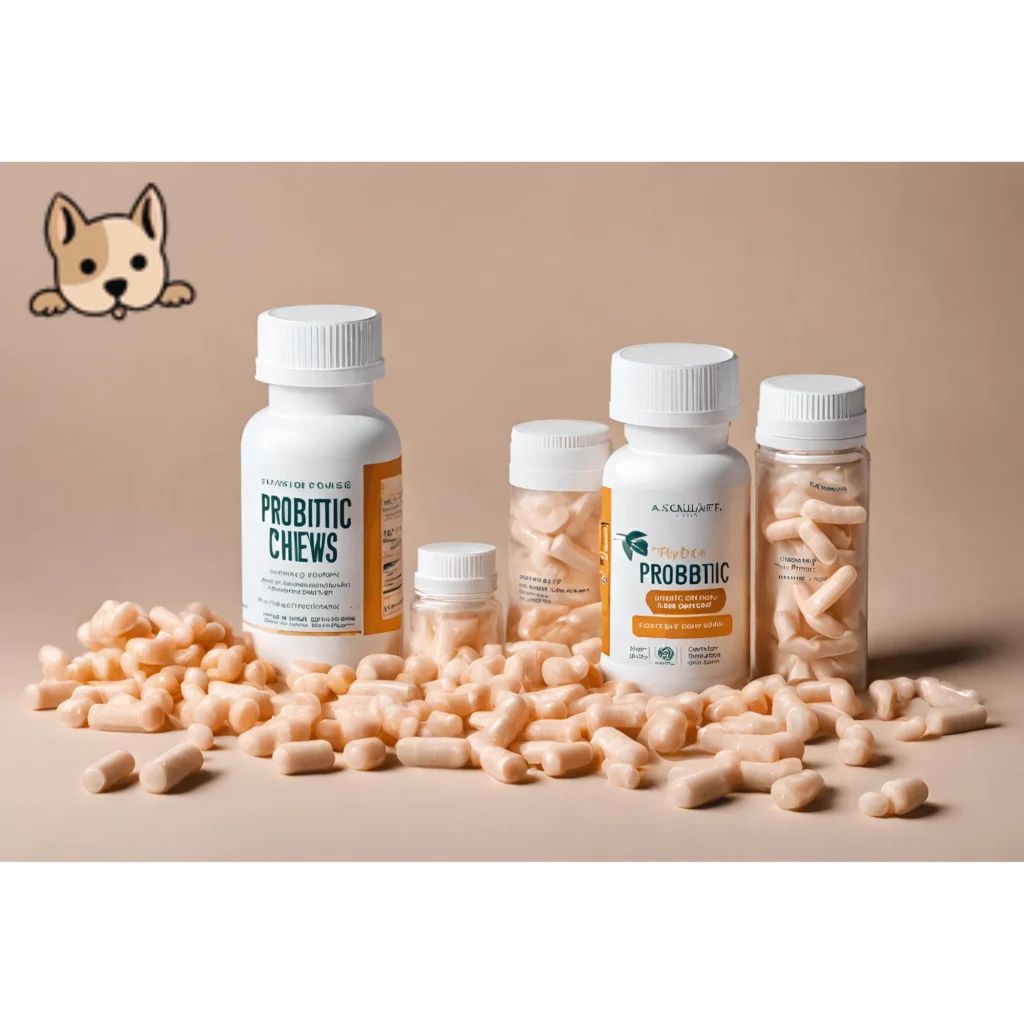
Probiotics for dogs are available in various forms, making it easier to find one that suits your pup’s preferences and needs.
- Powders and Liquids: These forms are simple to mix with your dog’s food. They’re ideal if your dog is wary of traditional pill forms.
- Capsules: Capsules can be opened and mixed with food, hidden inside a pill pocket, or even wrapped in peanut butter and fed whole. Ensure the peanut butter doesn’t contain any artificial sweeteners or added salt.
- Chews: Typically flavored, chews are given to dogs like regular treats.
It’s essential to consider that your dog’s body absorbs probiotics differently based on their form. Consult your veterinarian to determine which type would be best for your dog’s specific needs. Additionally, because the live bacteria in probiotics are sensitive to air, moisture, and temperature, some products come in individual serving packets to maintain freshness.
However, it’s important to note that if your dog is healthy, probiotics may not be necessary. Some experts caution against the routine use of probiotics in healthy animals. Always consult with your veterinarian before starting your dog on any new supplement regimen to ensure it’s appropriate for their health status and needs.
Conclusion:
In conclusion, probiotics can significantly benefit dogs by supporting their digestive health and overall well-being. While scientific research on probiotics for dogs is ongoing, many pet owners have reported positive outcomes.
Probiotics may help improve digestion, boost immune function, reduce digestive upset, manage inflammatory conditions, promote skin and coat health, enhance nutrient absorption, and mitigate the risk of antibiotic-associated diarrhea. However, it’s crucial to choose a high-quality probiotic formulated for dogs and consult a veterinarian before starting any new supplement regimen.
Monitoring for potential side effects, especially during the initial introduction of probiotics, is essential. Overall, probiotics can be a valuable addition to your dog’s care routine, but it’s vital to use them thoughtfully and under professional guidance to ensure your pet’s safety and well-being.
FAQs:
What is a natural probiotic for dogs?
Several natural food sources, such as live yogurt, sauerkraut, kombucha, cottage cheese, kefir, broccoli, bananas, and sweet potatoes, contain probiotics. These can be safely included in your dog’s daily diet to enhance their probiotic intake and promote digestive health.
Can I keep my dog on probiotics?
Vets may recommend specially formulated probiotics for puppies, which can be highly useful during this stage. Puppies experience various new experiences and dietary changes, which can lead to digestive issues like loose stools. Specially formulated probiotics can help support their digestive health during this crucial developmental phase.
How quickly do probiotics work in dogs?
The effectiveness of probiotics can vary depending on the issue being addressed. When using products like FortiFlora for digestive upset, improvement is typically expected within a few days, according to Dr. Cross. However, for immune health, it may take around four weeks to observe a positive impact on your pet.
Is honey a probiotic for dogs?
A small amount of honey given daily can be an effective way to alleviate stomach upsets in dogs. Honey contains both prebiotics and probiotics, which are essential for promoting healthy digestion. By providing these nutrients, honey can help maintain a balanced gut microbiome and support overall digestive health in dogs.






